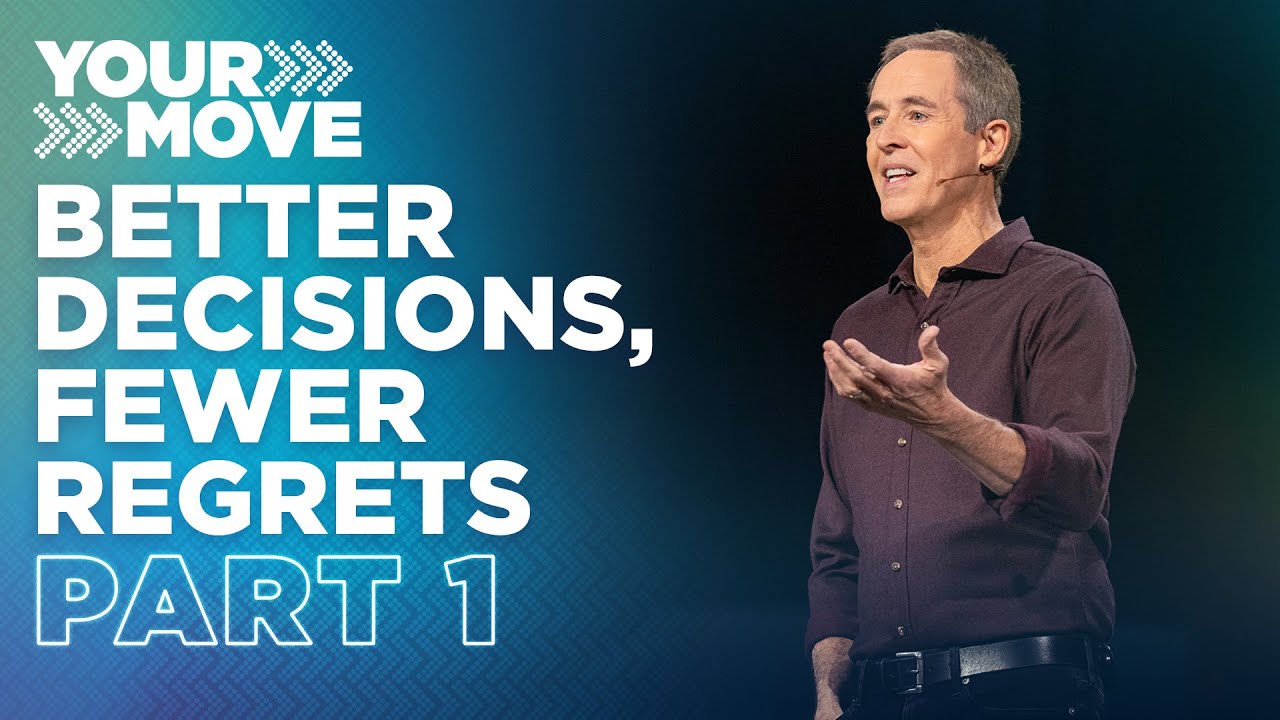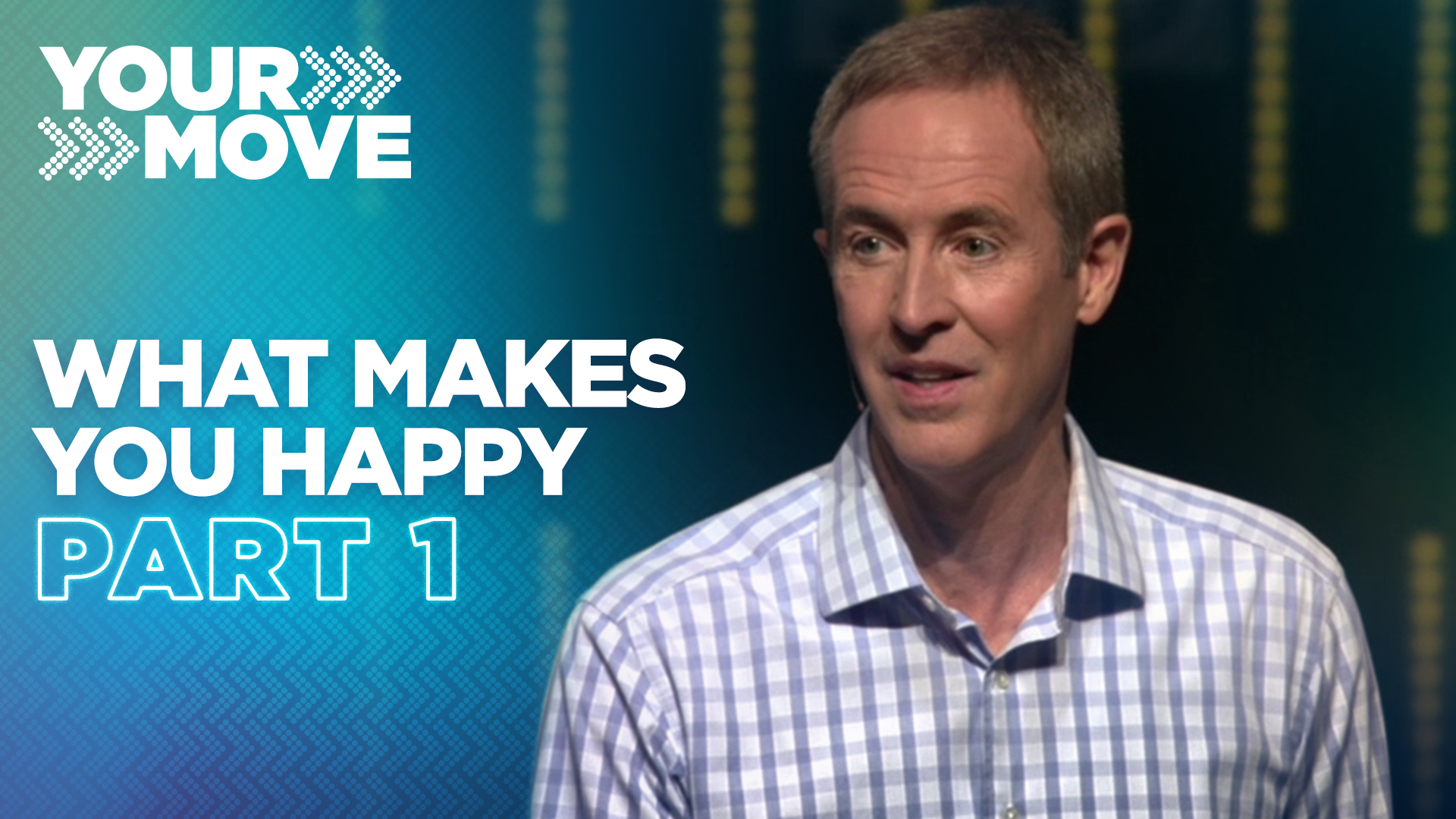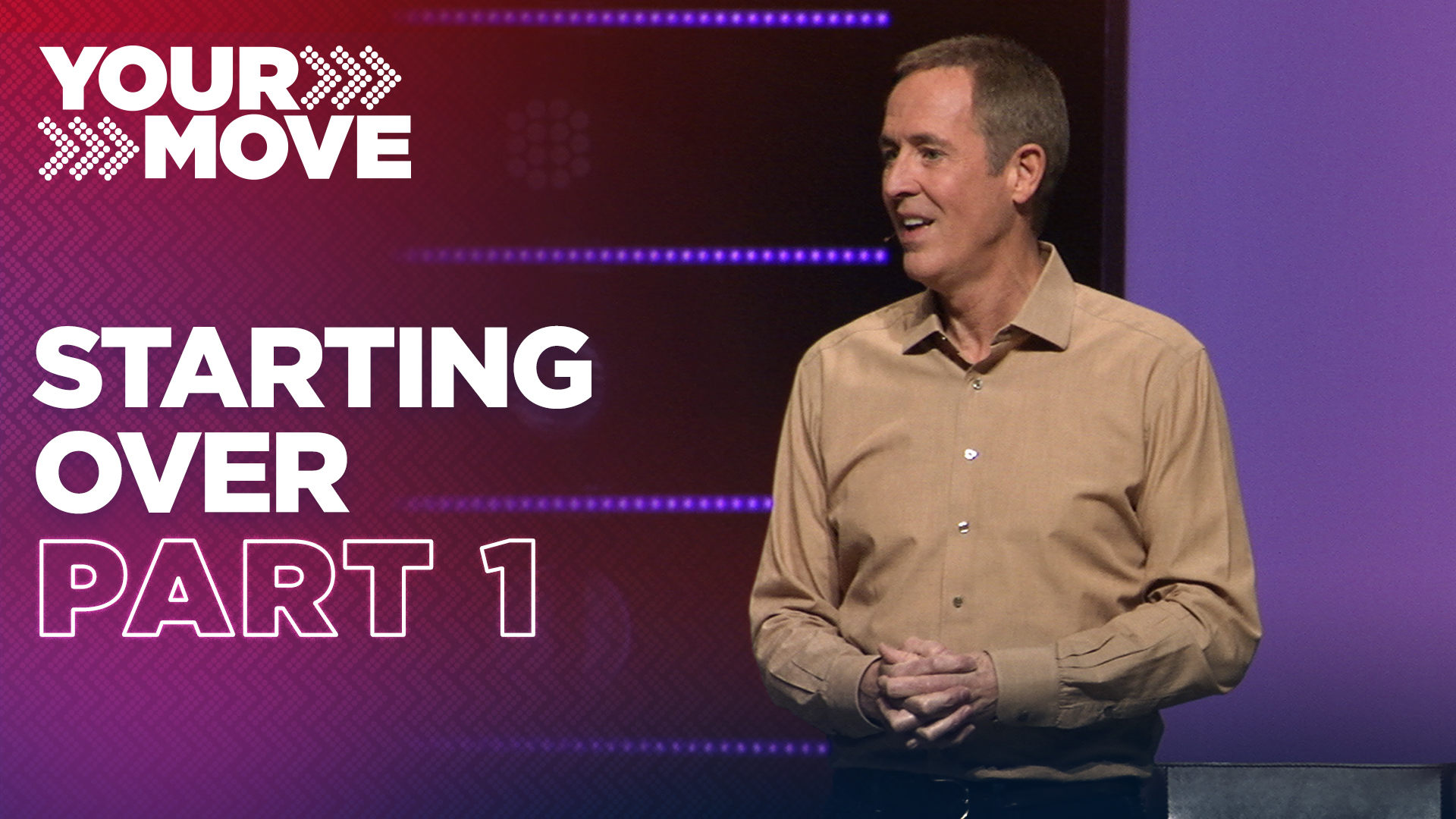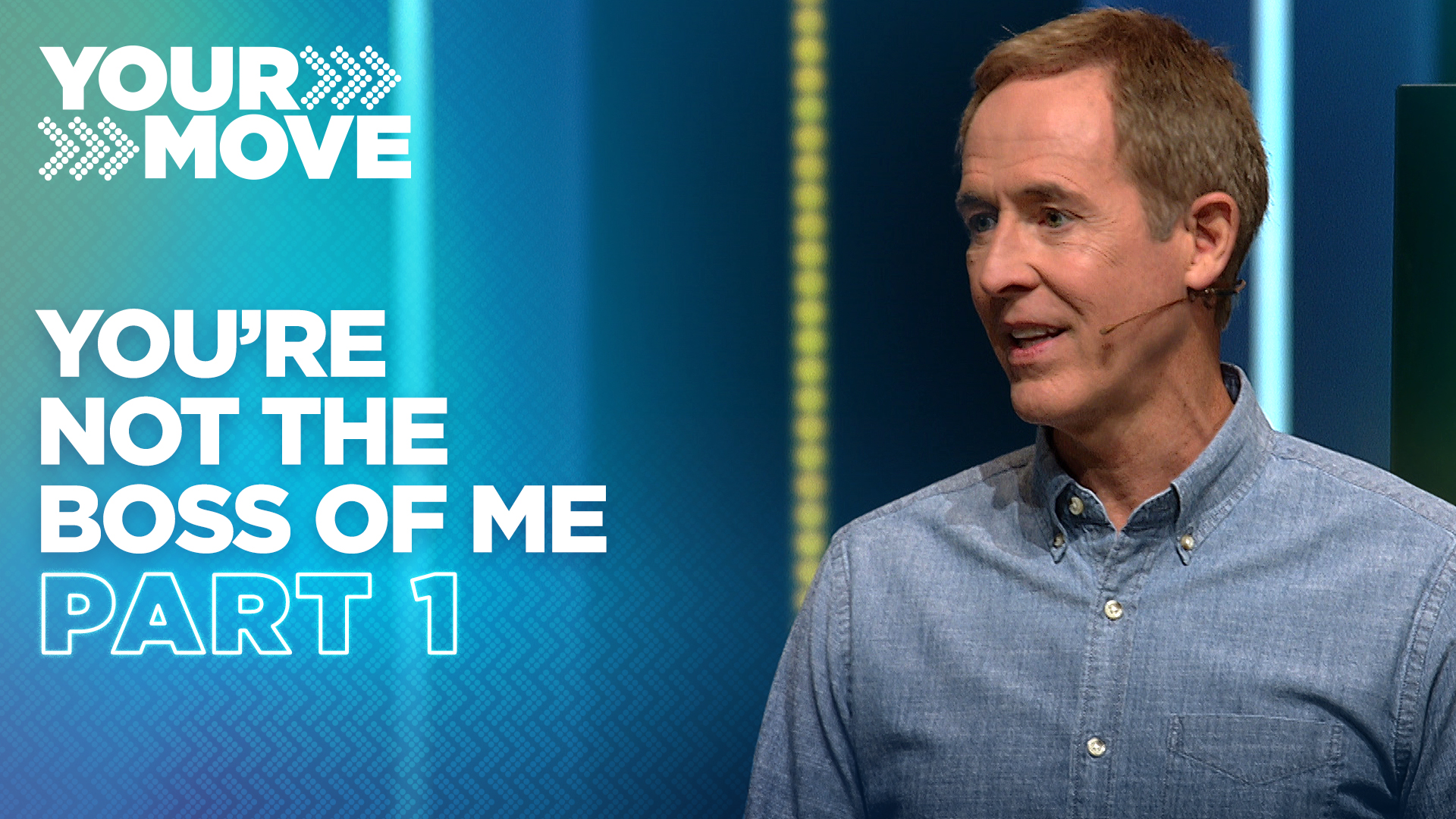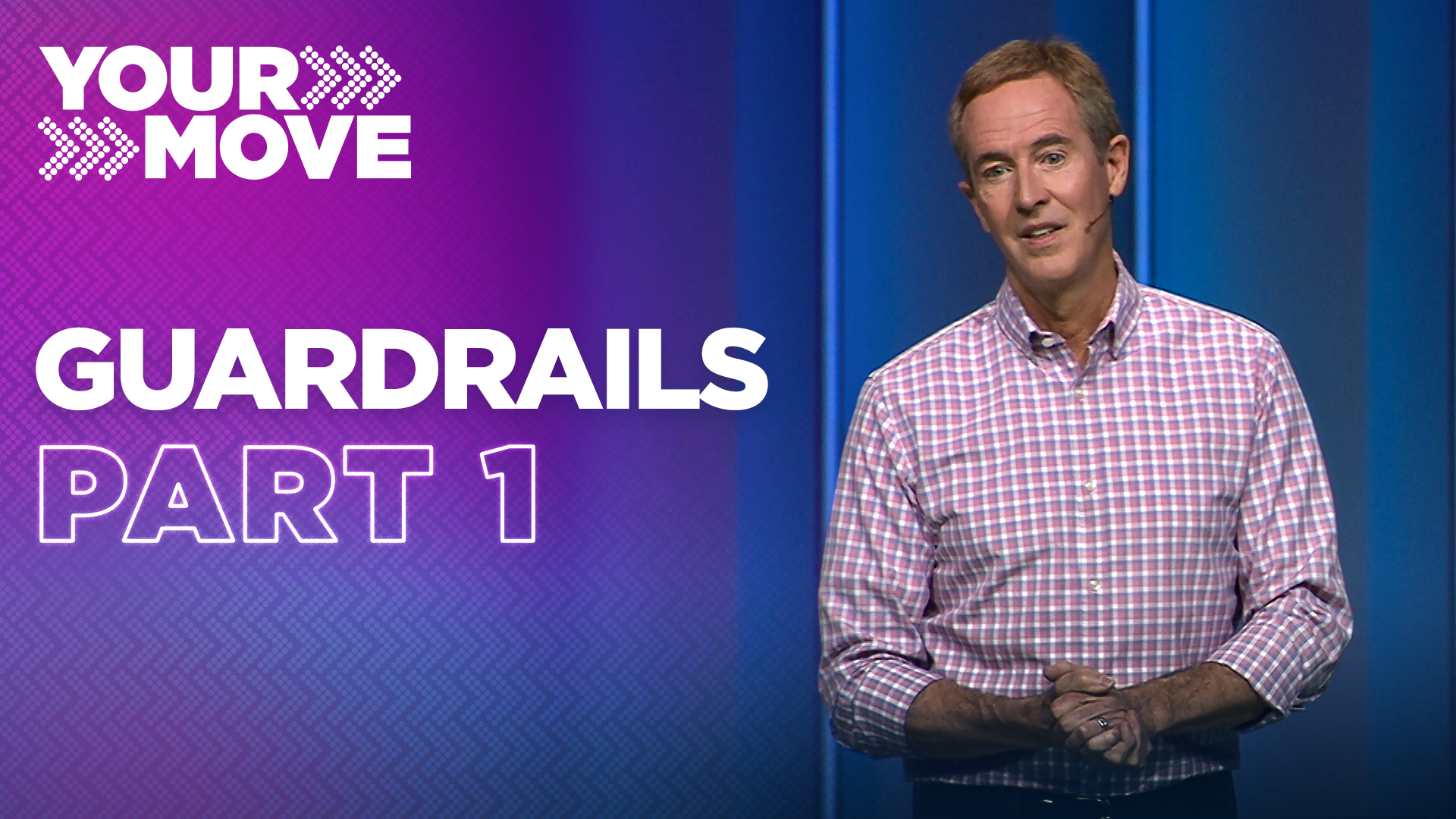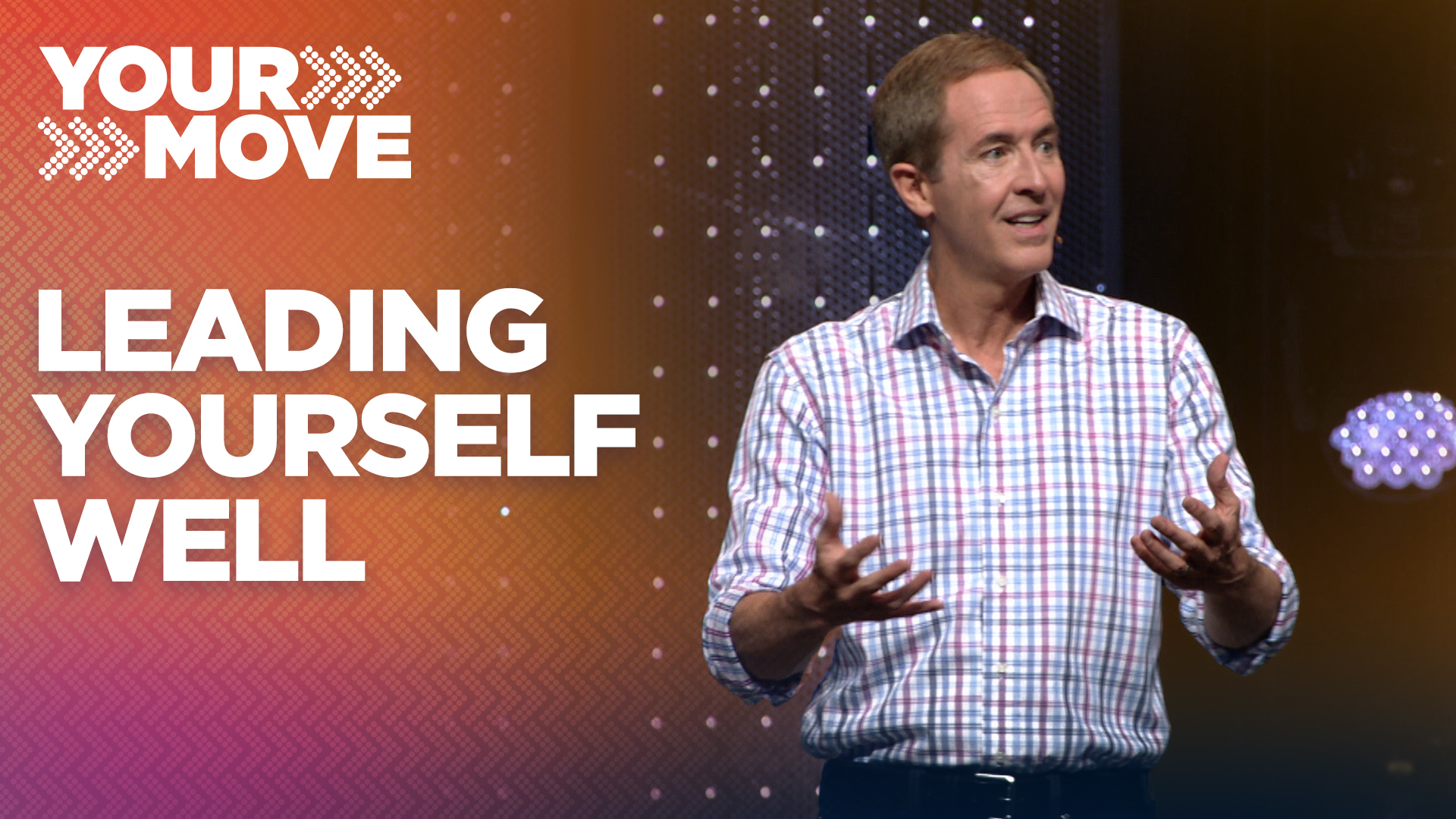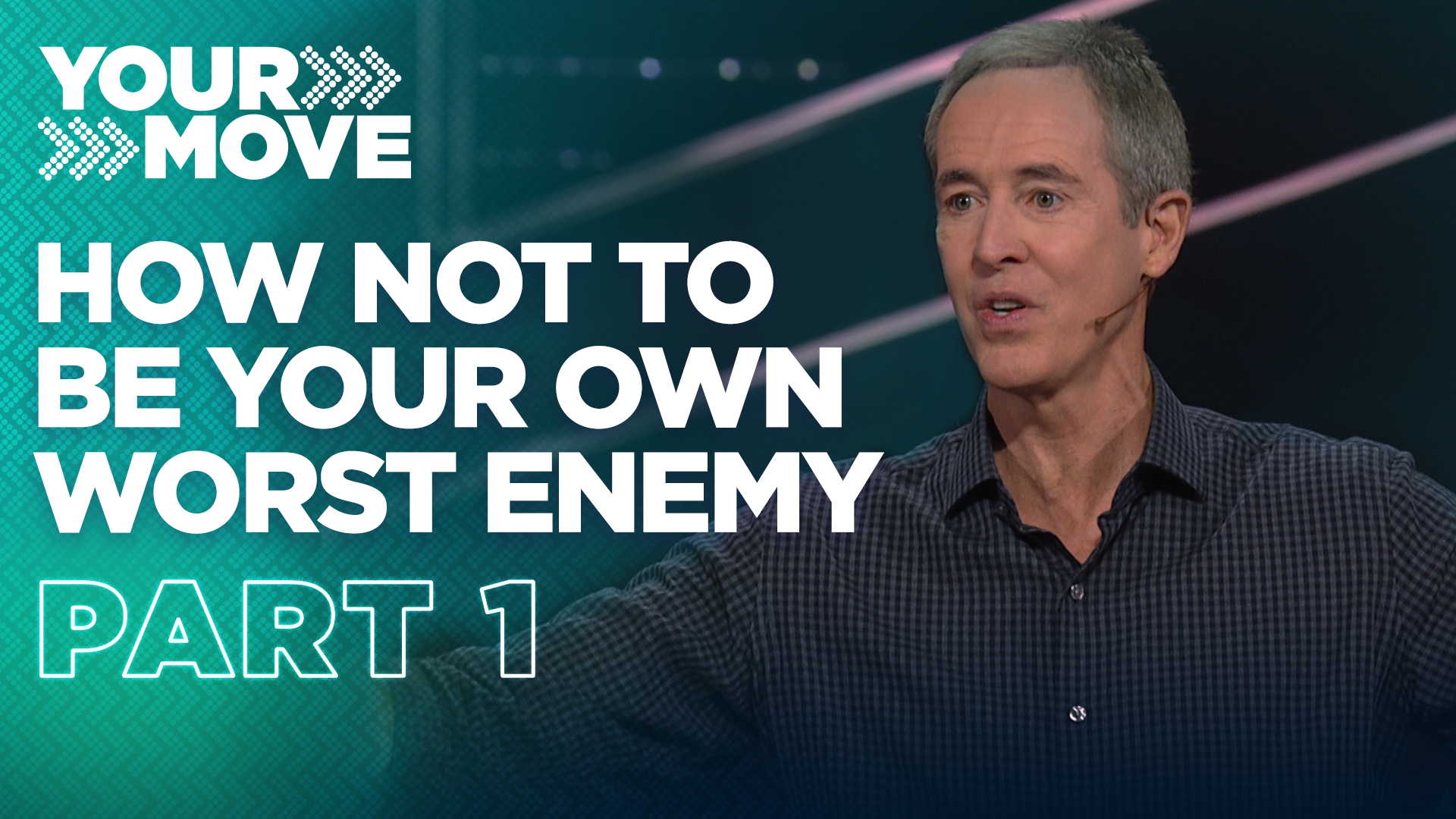Leaders are everywhere—in the community, at the office, and in our homes. But the ones worth following are those who first learn to lead themselves well.
- Think about a leader you admire. How have they led themselves well in order to lead others well?
- Is there a situation in your life in which you need to tell yourself the unfiltered truth? Explain.
- How are you tempted to choose what you want now over what you value most?
- Do your friends make you a better person? Why or why not?
- Andy mentioned that Jesus followers are characterized by their confidence in God (i.e., “faith”) and their love for others.
- Could embracing these two priorities help you lead yourself better? Why or why not?
- How might our country be different if we prioritized people like Jesus did?
NOTE: The following content is a raw transcript and has not been edited for grammar, punctuation, or word usage.
So I wanna begin by telling you something that’s super discouraging to me personally, and that’s this, that I have participated in every bad decision that I have ever made. I was there for all of them. All the bad financial decisions, all the bad parenting decisions, all the bad marriage decisions, not who I married, but once I got married the decisions I made within the context. I gotta be careful with that, within the context of that, of our marriage. [laughter] Professional decisions, every bad decision I’ve ever made, I was there for all of them. I’m the one who talked myself out of exercising, I’m the one who talked myself into desert. To take this a step further, I am often times a sucker for, “You might also like… ” And, “Customers who purchased also purchased… “
[laughter]
And it’s embarrassing, but the reason I feel like I can share that with all of you is not because we’re all close personal friends and not because it’ll stay in the room, it’s because you have participated in every bad decision you have ever made as well. In fact, here’s just the strangest thing, you were the mastermind. I don’t know how you figured it out, I don’t how long it took. You were the mastermind behind your greatest regrets.
And so the truth is, for all of us, and that’s what we’re gonna talk about for the next few minutes, that all of us, every single one of us, face our greatest challenge every morning in the mirror. My greatest challenge isn’t you, my greatest challenge isn’t my kids, my greatest challenge isn’t my profession, my greatest challenge isn’t money, my greatest challenge isn’t even my health. My greatest challenge every single morning, your greatest challenge, is the person in the mirror. The truth is, and I don’t know you, but I know this about you, you are difficult to lead. And you should know this because you, you attempt it every single day. So for the next few minutes, I thought, in light of where we are as a nation, we should talk about leading the American in the mirror.
Now granted, our favorite national pastime, and I get this and I’m part of this as well so I’m not pointing fingers, our greatest, our most favorite national pastime is criticizing the national leadership of the other party. Isn’t that our national pastime? It used to be baseball, but now it’s just criticizing national leadership, not of our party, of the other party. But again, speaking for myself, but I think I speak for most of us, I have done more, if I’m honest, I’ve done more to undermine my own success and progress than any political candidate elected to office ever. So today, leading the American in the mirror, which is not fun because it reminds all of us that we all have work to do. But this is an extremely important topic for a bunch of reasons.
I wanna give you three and then I’m gonna give you some real specific things to think about as we move into this week, and as we move into this next season as a nation. It’s a really big deal because you will never be a leader worth following if you don’t lead yourself well. You’ll never be a leader worth following if you don’t lead yourself well. You won’t be a leader worth following at home, you won’t be a leader worth following in the community, you won’t be a leader worth following at work, you will not be a leader worth following if you don’t get the self-leadership thing down right. Now to be clear and to be honest, exceptional self-leadership is not a requirement of leadership. You know a lot of leaders who are a mess personally. You know leaders who are a disaster personally. You may work for one, you may have grown up with one, we all know leaders who personally are a mess, they’re still leaders, so you don’t have to have your act together to be a leader, but you have to be extraordinary in self-leadership if you want to be a leader worth following.
And I’ll tell you where you learned this, the first time you saw this, even though you didn’t have words to put around it, was
at home, growing up. Because whether or not, whether or not you wanna be like your parents depends upon how well they led themselves. Many of you, like your parents, you don’t want to be like your parents, right? And when you talk about your parents, you have fun, affection and emotion, and then you find yourself qualifying, “I love my dad, my dad’s great, but I don’t necessarily wanna be like him. My mom, she… I like my ma, I love my ma, I love my mom, I don’t wanna be like my mom.” And whether or not you want to be like your parents has far more to do with how they led themselves than what they taught you, what they required of you, what they demanded of you, or even how they disciplined you. Why? Because you will never be, I’ll never be, we will never be leaders worth following in any capacity, in any arena, if we don’t get the self-leadership thing down.
The second reason is this, that exceptional self-leadership is the key to sustained influence. Now there’s a difference between influence and authority, you know that. There’s a difference between having influence and having a position or having a title. The influence is… There’s a relationship between influence and how well a person leads themselves, because we are rarely open to the influence of someone we don’t respect. And we don’t generally respect the people who don’t lead themselves well.
So if you want to leverage, if you want to leverage the respect, if you want to gain respect, if you want to maintain respect, self-leadership is the name of the game. There’s no way around that it is an essential to developing a respectful relationship or respect in the minds and the hearts of the people you want to lead.
You have respect for people who lead themselves well, even if you’ve never met them. If you have the impression, if you’re under the impression, even from a distance, a book you read, something you saw or heard about this person, when you have respect for someone you are open to their influence. And at some point in all of our lives we wanna have influence, so the self-leadership thing is critical.
The third reason that this is a really, really big deal, and this is again, they’re all three related, is that exceptional self-leadership is really the key ultimately to sustain performance. Because we know this, whether we’re talking about the home or the market place, when a leader burns out, or when a leader flames out, or when a leader has to be taken out, even when a father or a mother has to be taken out of a home, it’s generally because of poor self-leadership. It’s often related to self-leadership. Another way of saying that is that great leaders, great leaders last because they lead themselves first. Bottom line, they’re not gonna give you some handles for this, we are no better, I am no better, you are no better, we are no better than what we do. And there is only one person that can make us do anything and it is the person in the mirror. So this is a big deal. Whether you’re a religious person or not, this is a big deal. So today, I wanna give you three decisions, and that there’s more… Books have been written on this, articles, dissertations have been written on this topic, but I just want to give you three decisions that are super practical as you think about becoming a better self-leader. Because your future depends on it, and there’s no… This isn’t an exaggeration, your future depends on how well you lead yourself. And for those of you with people who report to you, for those of you who are organizational leaders, again, for those of you who are leading a family, the people who report to you, their futures depend on how well, not how smart, not how educated, how well you lead yourself. So real quick, I’m gonna give you three decisions.
Decision number one, and this is probably the most important. I will not lie to myself even when the truth makes me feel bad about myself. Now here is something that you will not hear said much in culture today, but this is true. Did you know there are worse things than feeling bad about yourself? [laughter] Did you know that? It’s like, “What? No, no. The worst thing in the world is to feel bad about myself, so I need to tell myself whatever I need to tell myself to feel good about myself.” No. There are worse things than feeling bad about yourself. You know what’s worse than feeling bad about yourself? Hanging on to what’s bad about yourself, that’s worse than knowing what’s bad about yourself, and then feeling bad about yourself. It is okay to feel bad about yourself if that motivates you to get rid of whatever it is that’s bad about yourself.
Back in the seventh century BC, there was a prophet, his name’s Jeremiah. In fact, Jeremiah, his prophecy is the longest book or the longest document in the entire English Bible. And Jeremiah was a prophet at a really unfortunate time, he had a terrible assignment. He was Jewish, he lived in Jerusalem, and God had warned the nation of Israel over and over and over, “If you abandon my ways, if you abandon my commandments, if you worship other gods, I’m just gonna have to put you in time-out.” That’s what God said. He said, “I’m gonna send the Babylonians, we’re gonna take all the leaders, we’re gonna send all the leaders to somewhere else to time-out, we’re gonna leave all the farmers because king Nebuchadnezzar was smart, he wanted the ground tilled, he wanted crops, but he’s gonna take all the leaders and put them somewhere else.” And so God kept warning, “If you don’t obey me, I can’t just sit back and do nothing. I’m your father, good fathers don’t sit back and let the kids run wild, they discipline their children.”
So the prophet Isaiah, they went to the king and to the leaders and said, “Okay, it’s game over, okay? It’s too late. The Babylonians are coming, Nebuchadnezzar’s gonna be outside the walls.” And imagine ii this is your assignment, to say to the king, “And you need to surrender the city. There’s no point in fighting, there’s no point in defending yourself, it’s too late. Open the gates, fewer people will die, less bloodshed, just let them in.” Well, you can imagine how this went over. So they took Jeremiah and they put him in a dry well. Well, it wasn’t exactly dry ’cause they’re never dry, so he’s knee deep in mud, and it’s kind of a funny story, and he keeps prophesying anyway. Imagine that you’re walking along and all of a sudden you hear this voice coming out of the ground, “Repent, repent.” You’re just like, “Where’s that coming?” So he kept prophesying from the well.
Well, as part of this prophecy, Jeremiah makes this… He says the Lord told him to prophesy and made this amazing statement that just falls right in the center of this conversation, and he makes a statement that we all know is true. And for those of you who don’t read the Bible, but have one, this has been sitting around in your house, you should read it. Here’s what he said, he said, “The Lord told me to tell everybody the heart is deceitful above all things.” Your heart, my heart, is deceitful above all things. How many things are there? A lot of things. Which one’s the most deceitful? Jeremiah says, “Well, God says your heart is the most deceitful, and it’s beyond cure. There is no hope, there’s no hope. It’s game over. There’s no hope. Who can understand it?” And the answer to the question who can understand, the answer is, no one.
And you don’t even understand your own heart, I don’t understand my own heart at times, right? This is why we say, “I don’t know why I did that.” Jeremiah would say, “I know.” “I don’t know why I bought that.” Jeremiah says, “I know.” “I don’t know why I called her back.” Jeremiah and all your friends say, “I know.” [laughter] “I don’t know why I said yes to that, I don’t know why I said yes to that again, I don’t know why I said yes to that for the third… I don’t… What’s wrong with me.” Jeremiah says, “I’ll tell you what’s wrong. It’s on the inside of you. Your heart is deceitful.” The easiest person in the world for you to deceive, the easiest person in the world for me to deceive, is the person in the mirror. Nobody does a better job selling you on bad ideas than you. You are a sucker for you. [laughter] As soon as you see something you want, you start selling yourself. Nobody’s more effective at selling you on stuff than you are.
So effective self-leadership requires brutal, this is why we don’t do it, brutal honesty with ourselves. And here’s why, you can’t lead yourself as long as you’re lying to yourself. Have you ever tried to lead a liar? If you’re in market place, if you lead a team at work, if you lead, do you know what you do with a liar? You fire a liar. You fire a liar. You can’t work with a liar. And so I think this is what Jeremiah would suggest. It’s certainly what I think you would suggest to me if you were up here talking to me. So I’m gonna suggest it to you. You need to fire the liar in you, and you need to hire someone who will tell you the truth, the difficult truth. From now on I will not lie to myself, from now on I will tell myself the truth. That’s the beginning, that’s the beginning of good self-leadership.
Now, here’s one more little handle and we’re gonna go on to number two. And we’ve talked about this before. At every juncture, at every decision, we all should hit pause and step back a little bit, even if it’s not physically step back, but at least on the inside, stop and ask this question, this is a powerful question, “Why am I doing this? Why am I doing this?” It’s true we do things without asking, “Why are we doing this?” And on the other side of the decision, we ask another version of the same question. What do we ask? “Why did I do that?” So why not ask a better version of the question on the front side of the decision, not “Why did I do that? Now it’s too late. Why did I go there? Why did I wear that? Why did I buy that? Why did I release that? Why did I rent that? Why, why… ” Why don’t we on the front end ask before we make the decision, “Why am I doing this?” And then here’s the thing that punctuates it, here’s the thing that brings a little emotion to the question, “Why am I doing this, really? Why am I buying this really? Why am I saying this really? Why am I… Why is it so important to me that he knows, that she knows, really? Why am I eating this really? Why am I postponing this really? Why am I avoiding her really? Why am I going there really? Why am I wearing that really? Why really?”
Jesus made a powerful statement in this regard. In fact, some of you don’t know Jesus said this because there’s about three or four things that politicians quote from the Bible always and this is one of them. The actual statement is, “And you shall know the truth, and the truth shall make you free.” And Jesus was talking about something very specific, but in this little formula he gives us, it’s so powerful, that truth really does set us free. Truth will set you free, but the opposite is true as well. And this is what Jeremiah’s point. Not only will truth set you free, dishonesty will imprison you. And if we are not careful, we imprison ourselves when we are less than honest with ourselves. So come on, you wanna lead well at home, you wanna lead well at work, you wanna lead well even if you’re just in charge of your homeowners association, God bless you. But whatever it is that you’re leading, you’ve got to tell yourself, we have to tell ourselves, the unfiltered truth. Now, here’s a little trick to give you a little space. If you tell yourself the unfiltered truth, you don’t have to actually do anything, but at least you owe it to yourself to know, “If I was to act on what I know is true, what is true? Why am I doing this, really?”
So, decide. Decision number one, I will not lie to myself even when the truth makes me feel bad about myself.
Decision number two, I will prioritize what I value most over what I want now. This is what great self-leadership is really all about. This is the long term, the long range, the finish line, the marathon approach to great self-leadership. So let me explain it this way. If you’re a leader of anything, let’s take family out of the equation for just a minute. If you’re an organizational leader of any sort, and you have a team you’re leading, you gotta know what the goal is, you gotta know what the destination is, you gotta know what you’re trying to accomplish as a team. So, if leading is about moving a group of people or moving even yourself in the direction toward a destination, the question we should all ask when it comes to self-leadership is this, “Where am I leading myself? Or, where are you leading yourself? If self-leadership is about moving in a direction, what direction are we going in?” And the answer, the correct answer, the answer that you should adopt, is that you are leading yourself toward what you value most, not what you want now, because what you want now is rarely what you value most.
Now, if you’re a Christian, if you’re a Jesus follower, there’s a twist to this one. And the twist is this, if I have devoted myself and if I have surrendered myself the best I know how, to God’s will and specifically what Jesus wants of me, in other words, if I say yes to the invitation that your Heavenly Father through His Son extends to every single one of you, and it’s a simple invitation, it’s simply this, “Follow me. Follow me. Follow me.” So if I really am a follower of Jesus, then I have to begin valuing what the one I follow values most. Now, if you’re not a Christian, hey, do anything you want, come out with your own values, you figure it out and go for it, but once a person decides, “You know what? I want to be a Jesus follower,” then it is incumbent upon us to discover what does my savior value most and how do I arrange my life around what He values most.
And fortunately, He told us. And you know what He said? He said, “What I value most is this, glorifying my Father in heaven by loving the people that are made in His image. I value most honoring God and demonstrating my honor and love for God by how I treat people.” Do you know what Jesus valued most? You, and the person to your left and your right, and your friends and your family, and the woman at work, you don’t even know her name, but you see here every day, and the person that you avoid because you really don’t like them. And your Father in heaven says, “Well, you may not like them, but I actually love them and I want you to figure out how to express value toward them.”
Here’s how Jesus said it. He got his guys in the room right before he was arrested, he made a statement where all most of us are familiar with, he said, “Okay guys, if you forget everything else, here’s kind of the bottom line for the three and a half or three years that we’ve been together.” He said, “I’m gonna give you a brand new command, and this brand new command is the synopsis of everything I’ve taught you. If you forget everything else, if you do this one thing, if you do this one thing well, you’ll get it right. When you get to the end, you’ll look back and go, ‘I got it right.'” He said, “A new command I give you, love one another,” to which they thought, “That’s not new,” to which Jesus said, “I’m not through. As I have loved you, so you must love one another.” We call this the platinum rule, not the golden rule. The golden rule is, “I’m gonna treat you the way I want you to treat me.” The platinum rule is, “I’m to treat you the way my Father in heaven through Christ treated me.” And it raises the standard, it raises the bar. And why would Jesus give them this command? Because this is what He valued most, He valued you. Is this important? He said, “Yeah, it’s important. By this, by this one command, everyone’s gonna know you’re my follower, that you’ve decided to wrap your priorities around my priorities, that you’ve decided to get your life in sync with my life. By this, everyone will know that you’re my disciple, if you love one another.”
Then years later the Apostle Paul, he’s on the other side of the resurrection. Paul hated Christians and then he became one, and it’s such a fascinating story, and the Apostle Paul, he said it this way, and this is, this is so extreme that you may be tempted to go check it for yourself, which that would be great. Here’s what the Apostle Paul said, he said this, “The only thing that counts… ” ” In other words, same as Jesus, “If you forget everything else, if you wanna know what counts… ” And what does count mean? Count means value. The thing that I value most, the thing that is most valuable, the only thing that counts is faith expressing itself through love. Confidence in God, that’s what faith is, confidence that God is who God says He is and He’ll do what He promised to do. Confidence in God and love for other people, that’s where Jesus’ followers go. That’s what they’re leading toward in terms of their personal self-leadership, and that’s where the people who follow them end up as well.
Now, when you hear that, and I understand this, you hear something like that and you go, “That’s so soft, you don’t understand my job, you don’t know what I have to do, you don’t know the people I have to deal with. I’m a public school teacher, the parents think they can do my job and they won’t… “. Or, “I work in this specific industry and it’s just cut throat and I just don’t know that that can be my ultimate value. I mean, am I are really gonna ever get anything done?” But let me put it in and account it in different way as well.
Would you be happy with your life if at the end of your life you had lived your life with faith and love at the center of your life? And I know the answer is, “Yes,” because every funeral I have ever attended shouts, “Yes,” as an answer to this question. Because every single funeral, the good ones and the, “Hey, let’s just don’t look over there, look the other way” funerals. Have you ever been to one of those where it’s like, “Somebody’s gotta say something nice about this person. I tell you what Pastor, just preach us the sermon, and we’ll go ’cause I know nobody wants to share. Go, we’re good.” You ever been to one of those? You know, three or four people there because nobody wants to talk. And then you’ve been to a funeral that fills up a big room and there the people are lining up. You know what you learn at every funeral? Don’t miss this, the value of a life is always measured in terms of how much of it was given away. The value, there’s our word, the value of a life is always determined by how much of it was given away. So do you know where we are to lead ourselves if we’re Christ’s followers? And you know what? Even if you’re not a Christian, I suggest you try it anyway. We are to lead ourselves toward valuing people because people matter and people count, and along the way you will get a lot of other things accomplished as well, but you still won’t shape western culture.
Okay, so decision number one, decision number one, I’m not gonna lie to myself even it makes me feel bad about myself. Decision number two, I’m gonna prioritize what I value most over what I want now. And the last decision we’re gonna talk about is this one, I will not attempt to lead myself by myself. So let me just make this clear and you may not agree with this, you can talk about it over lunch or talk about it later, but you can’t lead yourself by yourself. In fact your history, your positive history and the part that you hope no one finds out about, both sides of your history underscore the reality of this, you cannot lead yourself by yourself.
Think about this, your greatest regrets were with people you wish you’d never met. I’m gonna say as if it’s worse than that. Your greatest regrets involved friends that now you wish you never met. You weren’t with enemies, you weren’t with people who were against you, your greatest regrets were with people that you liked and they liked you, and you know what you shared? You shared common interest, but you may not have shared common values. So consequently, what he or she wanted now and what you wanted now ended up being a regret, but you were with people you like. Why? Because we all do life with people, and it’s not enough to simply do life with people we like because your life will be shaped and influenced by the people that you spend time with. Our friends… our friends determine the direction and the quality of our lives.
So again, we can’t lead ourselves by ourselves, we need community. You were designed, you were created for community, and you’re gonna find it somewhere, but you don’t simply need to be in a community with people who share your common interests. “Oh, we like the same music, we like the same restaurants, we like the same concerts, we like to vacation in the same place.” Great, you need to be surrounded with, you need to be in community with people who share your values, people who are moving in the same direction, people who will tell you the unfiltered truth because they value you.
Now, the downside to this “You can’t lead yourself by yourself” is this, you may lose a friend or two once you decide, “I’m gonna get this right,” because “value most” is threatening to folks who are living for “want now”. There is a conflict, but that’s okay, you can do this. Now bottom line, everybody come on, everybody ends up in life somewhere, right? Everybody’s gonna end up somewhere in life. I want you to end up somewhere on purpose. And there’s only one person that can determine where you ultimately end up, and it’s not the person in the White House, and it’s not the person in the House of Representatives, and it’s not even the person at the school house, it is the person in the mirror, because after all, we face our greatest challenge, we face our greatest leadership challenge every morning in the mirror. But we face something else as well. Please don’t miss this, every morning you face someone who is made in the image of God, and that person deserves the truth from you. You face someone who was created for community, and you face someone who does better when they prioritize what’s most valuable over what they want now.
So come on, lead yourself well. The person in the mirror is depending on you. And if you’re a parent, there are some little faces and some smaller mirrors who are depending on you as well. And for those of you who are single, here’s what I know about you, you are looking for someone who is leading themselves well. So come on, let’s be authentic, let’s be genuine. Be the leader the leader you are looking for is looking for. If you’re looking for someone who’s leading themselves well, and I hope that’s who you’re looking for, then you’ve got to become the person you’re looking for. If you do, you will be easier to spot because nothing, nothing, nothing, nothing, nothing says more about you than how well you lead yourself. So, let’s just decide, I will not lie to myself even when the truth makes me feel bad about myself. I will prioritize what I value most over what I want now, and I’m going to spend the time I need to spend figuring out, “What is it I value most?” And I will not attempt to lead myself by myself. If every American made these three decisions and stuck to it, we would be greater than ever because at the end of the day, our nation will never be greater than the Americans in the mirror.


